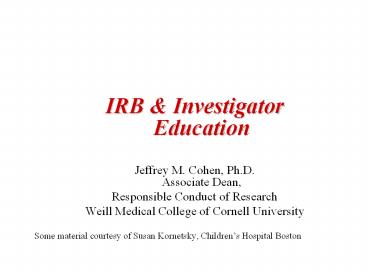IRB - PowerPoint PPT Presentation
Title:
IRB
Description:
NIH Education Requirement. OHRP Guidance. OHRP Education ... http://grants.nih.gov/grants/ guide/notice-files/NOT-OD-00-039.html. Frequently Asked Questions ... – PowerPoint PPT presentation
Number of Views:24
Avg rating:3.0/5.0
Title: IRB
1
- IRB Investigator Education
- Jeffrey M. Cohen, Ph.D.Associate Dean,
- Responsible Conduct of Research
- Weill Medical College of Cornell University
- Some material courtesy of Susan Kornetsky,
Childrens Hospital Boston
2
Why emphasis on IRB education?
- Lack of knowledge root cause of most problems
- Part of OHRPs required actions by Johns Hopkins
- A satisfactory plan to ensure that all IRB
members, all IRB staff, and all research
investigators are appropriately educated, on an
immediate and ongoing basis, about the regulatory
requirements for the protection of human
subjects.
3
Topics
- Who needs education
- Why they need it
- How to do it
- NIH Education Requirement
- OHRP Guidance
- OHRP Education Programs
4
- Who, Why and How
5
Who needs IRB education?
- Institutional Officials
- IRB members / Chairpersons
- IRB professionals
- Principle Investigators
- Research staff ( research nurses, research
assistants) - Others involved in clinical research (pharmacists
)
6
Why educate Institutional Officials?
- The buck stops here. Signs the assurance.
- Sets tone for institutional culture of respect
for IRB process. - Acts on behalf of institution
- understand process
- resource/staffing needs
- ramifications of non-compliance
- contact for OPRR
7
Why educate IRB members/ Chairpersons?
- Must understand regulations to apply to review
process - Understand role and responsibility
- Has ultimate authority in reviewing, approving,
suspending research. - Need to recognize new concerns, interpretations
of regulations, policies
8
Why educate IRB Professionals?
- Responsible for day to day operation
- Liaison between staff and IRB
- Professional association allows them to keep
current - Eyes and ears of what is happening
- Maintain history/consistency of IRB review
process - Provides training/education on an ongoing basis
9
Why educate Researchers/Support Staff?
- Front line interaction with subjects
- It is their research, they hold ultimate
responsibility - Must understand/accept and buy into human
subject protections - Cannot expect PIs to receive education elsewhere
- Must differentiate role as clinician/provider and
researcher
10
Considerations for Educating an Institutional
Official?
- Do they attend IRB meetings?
- How involved are they in policies/procedures/
recordkeeping? - Who is responsible for keeping them advised.
- Should attend segments of any training provided
by IRB - Strongly recommended under FWA
11
Considerations for IRB Professionals/Chairpersons
- Strongly recommended under FWA
- Budget money for travel to national meetings,
seminars - Membership in professional organizations (ARENA
newsletter) - Network, network, network
- Encourage certification
12
Considerations for PI and Staff
- What time is required and when?
- Who mandates it, makes a difference
- Address pertinent issues
- Use of cases works great !
- Apply concepts, do not just present abstract
ideas - Stress ultimate responsibility of PI
13
Methods For Education
- Lectures, seminars, courses
- Web based tools
- NIH tutorial
- CITI
- Self study with or without test
- University of Rochester book and test
- Required for all PIs performing gt minimal risk
research - CME Credit
- Outsource
- PRIMRs Program IRB 101
- one day program, history ethics, overview of
regulations, case studies - 2-4 expert faculty come to institution, some room
for individualization
14
Internal vs External Training
- Internal programInstitution develops their own
program - Pros Can individualize for needs and culture of
institution - Cons Labor and cost intensive
- External program Adapt established educational
programs - Pros Why reinvent the wheel? May reduce costs
- Cons May need to adapt
15
- NIH Education Requirement
16
NIH Education Requirement
- Took effect 10/1/2000
- Applies to all key personnel
- Description of education to be included in cover
letter certifying IRB approval in keeping with
Just-In-Time provisions - No NIH standards for adequate education
17
NIH Education Requirement
- Basic Noticehttp//grants.nih.gov/grants/guide/n
otice-files/NOT-OD-00-039.html - Frequently Asked Questionshttp//grants.nih.gov/g
rants/policy/hs_educ_faq.htm - For Further Information contact Belinda Seto
(bs11e_at_nih.gov).
18
URL http//cme.nci.nih.gov/
19
- OHRP Guidance on Education Programs
20
OHRP Federalwide Assurance
- Completion of OHRP Assurance Training Modules
- The Institutional Signatory Official
- The Human Protections Administrator (e.g., Human
Subjects Administrator or Human Subjects Contact
Person) - IRB Chairperson(s)
- Institutions should establish education programs
for IRB members and investigators - Completion by investigators should be documented
21
URL ohrp-ed.nih.gov
22
Recommended Features
- Ongoing
- One-time presentations inadequate
- Broad based
- Institutional Officials
- IRB members
- Investigators
- Staff
- Not voluntary
23
Content
- Ethical principles of human subject research
- Requirements of the Federal regulations
- Applicable state law
- Provisions of Institutional Assurance
- Institutional policies and procedures for the
protection of human subjects
24
OHRP Education Programs
- Presentations and Training Programs
- Workshops and Town Meetings
- Video Town Meetings
- For further information on both of the above
contact Darlene Ross (dr20a_at_nih.gov) - Educational Materials
- PRIMR Investigator 101 CD
- IRB Guidebook (1993)http//ohrp.osophs.dhhs.go
v/irb/irb_guidebook.htm - Federal-wide Guidebook (2003)
- Videotape Series "Protecting Human Subjects
(1986)http//ohrp.osophs.dhhs.gov/references/reso
urce.htm































